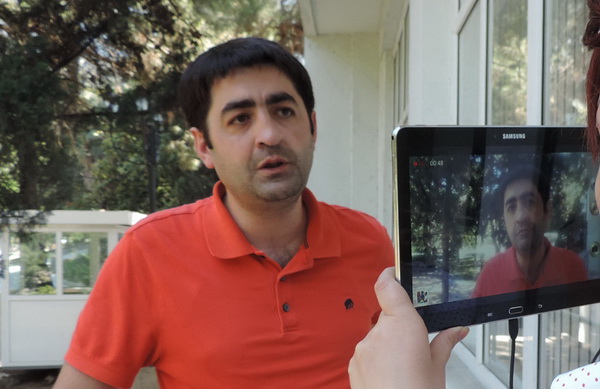Arsen Kharatyan, a Management Board Member of “Civil Contract”, who due to circumstances has left for Tbilisi for residing for five years, is now living in this city for more than four months. At the request of “Aravot,” A. Kharatyan presented his impressions about Armenian community in Tbilisi. “In these four months, I have noticed a couple of interesting processes. In some respect, the Armenian community flourishing, it begins uniting around our church. “Hayartun” Cultural Center starts operating; the primary school is operating. These are quite positive impetus and activeness is observed. But at the same time, there is a broad number of problems, which the community is surrounded by. And this latest incident, which happened near the St. Etchmiadzin Church, was associated with these problems.
And the matter was not only the everyday incident. Look at the Georgian-Armenian Diocese Church of St. Gevorg, it is in the recovery phase. The Armenian theater in Tbilisi is not operating for several years, because of being subjected to demolishing. Willy-nilly, everything associated with the Armenian community is centered around St. Etchmiadzin Church, which is located in the very heart of Havlabar. Look, during the Palm Sunday, about 14 thousand people visited St. Etchmiadzin. Note that the church is located in the middle of several narrow streets, and, naturally, the neighborhood is having objective problems because of it. And let’s put aside the question of whether there is Armenophobia or any other phobia in Georgia, but we cannot turn the blind eye on objective and physically-existing problem. When two churches were operating, the crowd of people was at least divided during the holidays. And now all have only St. Etchmiadzin not only as a church, but also as a cultural center, as “Hayatun”, where the Armenian elementary school is located, various clubs are operating, Saturday and Sunday schools are operating, and there is constant flow of people there throughout the day. So, this is really a big problem,” he told.
As assessed by A. Kharatyan, to avoid other further clashes, required action should be taken for restoration of the theater. “For several years, the theater is in demolishing condition, but is not renewed. The theater is a state funded institution, and I think as the Georgian Ministry of Culture so as the Armenian community and the Armenian government have a task to do here. Perhaps, there is a need for a bit of funding to speed up the work, renew the theatre and begin operating.”
In response to the question of “Aravot” whether there are some problems within the community: in-between the political parties, clans, etc., A. Kharatyan noted that the community is certainly not homogeneous, there are people affiliating to different streams, but as a non-homogeneity criterion of the community, our Tbilisi interlocutor said that there is no Armenian in the Tbilisi urban government staff. “There is no singly Armenian in the Tbilisi City Council that has hundred and thousand Armenian population. There was only one candidate, which was not even elected. This means that there is an inter-community problem.” As a gap in community life, Arsen Kharatyan mentioned the lack of information sources. “There are only two Armenian-language newspapers in Tbilisi, one of this is the state funded “Vrastan” weekly, which almost serves the role of an official newspaper, and the second is “Hayartun” publication, “Ardzagank”, which has issued only three editions.
Read also
There are a couple of web pages, as well as state funded 12 -minute reports every night over public television and public radio, in a language of ethnic minorities: Armenian, Azeri, and Abkhazian… But in reality, all of that is not enough. And often we encounter the fact that in crisis situations, such as the incident near the St. Etchmiadzin Church in recent days, there was no single clear source, from which, both the Armenian and the domestic media sources could get reliable information. The presence of a full Armenian-language media source is needed, which will cover not only the community and inter-community problems, but also the domestic life in Georgia.”
In response to our question of whether there is the problem of Armenian preservation in Tbilisi, our interlocutor said, “I do not think that there is an active process of alienation here. I have not noticed it yet. They say that there are cases when Armenians are re-baptized in Georgian churches, and this may be due to the intervention and pressures. However, I have not noticed that it is a massive process. I have seen the opposite, there is a lack of integration.” As the most important question, Arsen Kharatyan emphasized Georgia’s disproportionate economic dependence on Turkey and Azerbaijan, and in that situation, according to the expert, any restrain or aggravation of tension in the Armenian-Georgian relations would be more than short-sighted and non-beneficial for Georgian-Armenians and for the Republic of Armenia. “This is my opinion. I would like to bring an example. When the reopening of Abkhaz railway was in discussion, about which Ivanishvili spoke in Yerevan, all of a sudden, a few “SOCARs” begin to close up here (“SOCAR” is an oil company that has a network of petrol stations in Georgia – M. B.), then Azerbaijan defined an import tax on vehicles manufactured before 2004, while Georgia’s 25% of GDP is generated from the sale of the vehicles to Azerbaijan… I do not know to what extent all these are associated with each other, but one thing is obvious, Azerbaijan’s economic impact on Georgia reaches the scales that this country has leverages on Georgia. From that standpoint, I think that with regard to Armenian-Georgian relations, it is right not to giving away to light tension, aggravating the tension, but relying on the tradition of warm relations between Armenia and Georgia. Yes, there are problems, they are many, no one denies, but why not recalling the positive, and not focusing on the positive.”
Melania BARSEGHYAN
“Aravot” Daily 02.08.2014


























































